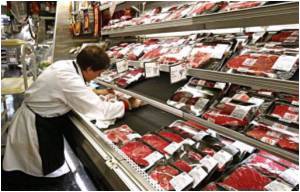Increased consumption of red meat and reduced intake of fruits and vegetables raises the levels of serum phosphate in the body and increases biological age.

The chronological age is the years of age, whereas the biological age is the “miles on the clock.”
The research led by the University of Glasgow looked at the participants from the most deprived to the least deprived in the NHS Greater Glasgow Health Board area. The study found that deprived males were the worst affected.
The results of the study suggested that the increased biological aging and diet-related phosphate levels among the most deprived males were directly related to their frequency of red meat consumption.
The increased consumption of red meat affects the most deprived because of their poor diet and poor intake of fruits and vegetables.
The researchers also found that high phosphate levels were also found to be linked to reduced kidney function and even underlying mild to moderate chronic kidney disease.
Advertisement
“We think in this group the effects of high serum phosphate intake may be exacerbated. Indeed, it’s notable that these effects are not apparent among less deprived males, or in females, especially in the context of a more balanced diet.”
Advertisement
Prof Shiels added, “Strikingly, many of the subjects had kidney function indicative of incipient or early onset chronic kidney disease.”
“It has also not escaped our attention that red meat product quality and preservation may have an impact on the diets of the most deprived and their associated health.”
The study entitled Accelerated Aging and Renal Dysfunction Links Lower Socioeconomic Status and Dietary Phosphate Intake, has been published in the journal Aging.
Source-Medindia











